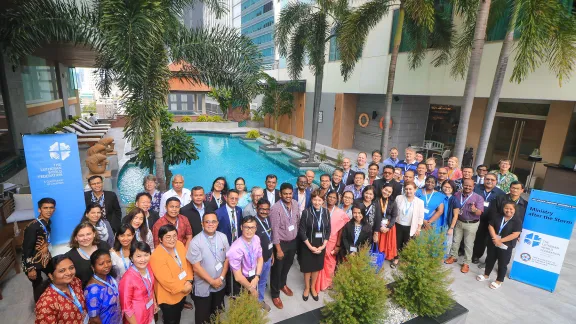
Participants in the Asia Church Leadership Conference gather outside the conference venue in Bangkok, Thailand. Photo: LWF/J.C. Valeriano
Asia Church Leadership Conference concludes with pledge to “listen, connect and engage” with people of God
(LWI) - Lutheran leaders from the Asia region have concluded their first in-person encounter since the onset of the COVID-19 pandemic with a pledge “to promote discernment, dialogue and critical thinking” within their churches in order “to become prophetic witnesses to the gospel.” They acknowledged the need “to recognize the grace given to others with whom we disagree and to realize that God works in different ways in different contexts.”
At the conclusion of their 18-23 May Asia Church Leadership Conference (ACLC), participants also committed “to listen, connect and engage with our members, to empower the ministry of all believers, remembering that the church is not a building or an institution, but the people of God.”
The concluding message from ordained and lay leaders of churches in Thailand, India, Indonesia, Malaysia, Korea, Australia, the Holy Land and the Philippines, was read out during a Sunday worship service at the Bangkok headquarters of the Evangelical Lutheran Church in Thailand. Leaders of other churches in the region were unable to attend because of ongoing quarantine requirements or visa restrictions.
Stories of hope and resilience
The Lutheran World Federation (LWF) General Secretary Rev. Anne Burghardt preached at the service which was led by newly elected Bishop Chanda Saiyota. It included a moment of remembrance, naming many of the Asian church leaders who died from the COVID-19 virus. Members of many churches in the region also suffered severe loss of livelihoods and were deeply grateful for financial support they received from the LWF’s Rapid Response Fund during the first and second waves of the pandemic.
At the conference, bishops, women leaders and youth delegates shared stories of hope and resilience, recounting ways in which they reacted to the new challenges of online ministry, drawing especially on the skills and creativity of the youth in their congregations. Most churches, even those with small numbers and few resources, also responded to the needs of destitute people in their communities and beyond, collecting and distributing food, medicines, masks and other essential items.
One bishop from Malaysia said Coronavirus had been “an acid test of both the authentic community spirit of a church and the capacity of its pastor to preach and communicate a meaningful message of God’s love in such uncertain and challenging times.” Another from Indonesia said the pandemic reminded pastors of the “generation gap in ministry and of the need to transform worship from “a Sunday ceremony” into an encounter with “the sanctity of everyday life.”
Meaningful inclusion of women and youth
From small group discussions to plenary presentations, women and youth leaders posed searching questions about the need for better representation and more meaningful inclusion in all decision-making processes. “We don’t want to be ornaments or token accessories,” one young woman said, “we want to be instruments of service and transformation for our churches today.”
In the concluding message, participants pledged to explore together with ordained and lay women, as well as with youth leaders, ways of responding to their requests for stronger capacity building, better financial support and more transparent communication. They also committed to reflect further on the lessons of the pandemic about “the profound interconnectedness of all human beings and of God’s creation.”
“COVID has reminded us of our human weakness and of the need to show greater solidarity with all our neighbors in need,” they said. Looking ahead to the 2023 Assembly in Krakow, Poland, delegates also pledged to pray and prepare their congregations for this key moment in the life of the global communion of churches.
LWF/P. Hitchen


